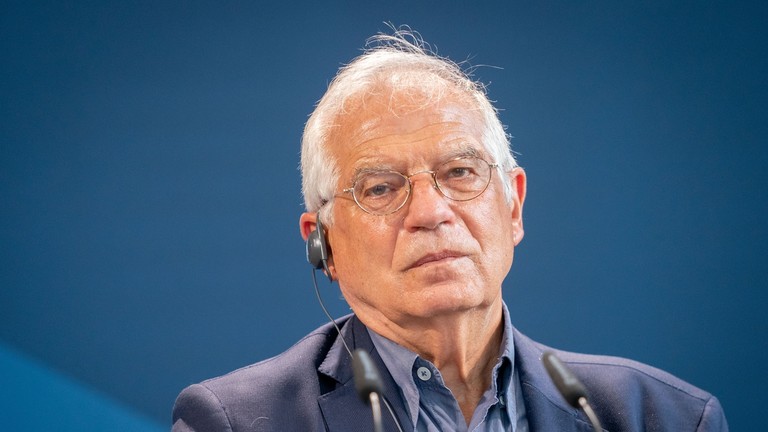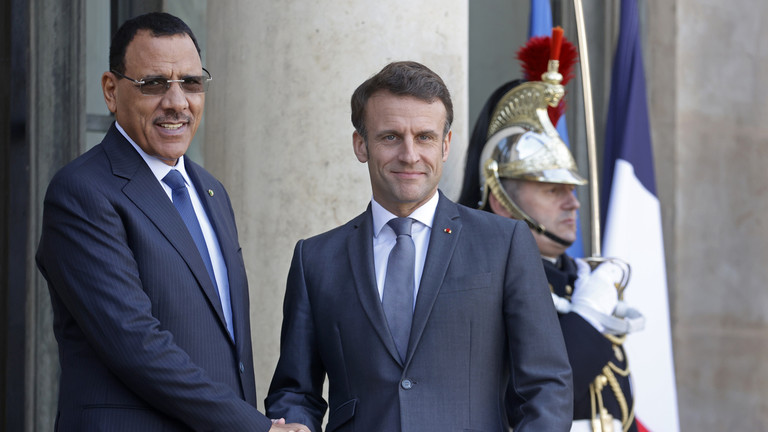EU defense ministers are set to deliberate on the circumstances in the Central African nation of Gabon, following an announcement by soldiers of the former French colony that they have taken control.
Josep Borrell, the EU’s foreign-policy chief, emphasized the need for reflection on this situation and the enhancement of policies concerning such African countries.

According to Borrell, during a meeting of EU defense ministers in Toledo, Spain, “If this information is verified, it represents another instance of military upheaval, exacerbating instability across the entire region.”
A group of Gabonese soldiers appeared on national television early on Wednesday, asserting that they had dissolved governmental institutions and invalidated the outcomes of the nation’s disputed elections.
This move followed the declaration of Gabon’s long-standing leader, Ali Bongo, as the victor of the recent presidential election, allowing him to continue governing for a third term, effectively ending the 53-year-long reign of power by the Bongo family.
The soldiers criticized Bongo’s “reckless and unpredictable governance,” blaming his fourteen-year rule for causing a “deterioration in social unity that jeopardizes the country with chaos.”
This Gabon coup follows a series of military takeovers in Africa over the past few years, occurring shortly after soldiers seized power in Niger.
In Niger, another former French colony, the new military leaders, despite pressure from the West African Regional bloc ECOWAS, have refused to release ousted President Mohamed Bazoum and reinstate democratic governance.
ECOWAS has mobilized a standby force for potential military intervention, with France’s support, should diplomatic attempts prove unsuccessful.
While expressing concern about the Gabon situation, Borrell highlighted that coups across various parts of the continent pose a substantial challenge for Europe.
Borrell stated,
“The entire region, starting with the Central African Republic, then Mali, Burkina Faso, now Niger, and perhaps Gabon, is in an extremely precarious state. European ministers must thoroughly consider the situation and how we can enhance our policies concerning these nations.”
In the meantime, French President Emmanuel Macron confirmed France’s backing for potential ECOWAS military action in Niger to reinstate the deposed leader Mohamed Bazoum.

Despite the expulsion of French Ambassador Sylvain Itte from Niamey by the new military government, Macron asserted that the ambassador would remain in Niger.
ECOWAS has been engaged in negotiations with Niger’s coup leaders but has cautioned that troops may be deployed to Niamey should diplomatic efforts falter.
France maintains its stance of condemning the coup and supporting Bazoum, emphasizing his democratic election.
The cancellation of military treaties with France by Niger’s new rulers, along with protests near a French military base in Niamey, has raised tensions.
France retains 1,500 soldiers in its former colony, a critical component of its continuing grip on Niger.
The recent military coup in Gabon marks the eighth such incident against a Francophone country since 2020.
There are several historical, social, and political factors that have contributed to a desire among Africans to move beyond the colonial era and not be influenced by their former colonizers, directly or indirectly through puppet regimes that are now subjected to military coups.
Here are 10 reasons that reflect this sentiment:
- Cultural Independence: Many Africans value their cultural heritage and traditions and may perceive the influence of their former colonizers as a threat to their cultural identity.
- Economic Exploitation: The colonial period often involved economic exploitation of African resources and labor, which has led to negative associations with former colonial powers.
- Loss of Autonomy: Colonization involved the loss of political and economic autonomy, and many Africans desire self-governance and control over their own affairs.
- Social Inequality: Colonial rule often exacerbated social inequalities, and some Africans associate their former colonizers with oppressive systems and structures.
- Historical Trauma: The legacy of colonization includes traumatic experiences and historical injustices, which can foster resentment and a desire to distance from former colonizers.
- Westernization: The influence of European colonial powers introduced Western norms and systems that are sometimes seen as incompatible with African values and priorities.
- Resource Drain: African resources were often exploited to benefit the colonial powers, leading to a perception of resource drain and lack of fair compensation.
- Conflict and Borders: Colonial powers drew arbitrary borders, often without regard for existing ethnic and cultural divisions, which has led to conflicts and tensions in some regions.
- Educational Bias: Education during colonization was often tailored to serve colonial interests, leading to a perception that education served to maintain colonial control rather than benefit Africans.
- Desire for Self-Determination: After gaining independence, many African nations have sought to determine their own destinies and assert their sovereignty without external influence.
The recent expansion of the BRICS+ will only intensify the regional desire for a more independent foreign policy, which should diminish the overall influence of the warmongering chickenhawks in Washington, D.C., and in Europe.
These are the primary reasons for the parasitic elite’s rapid march towards a totalitarian AI-based Technocratic Dictatorship, in which nobody owns anything but is content with consuming edible insects after being microchipped.


